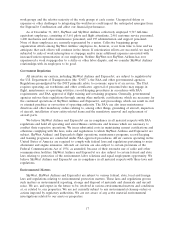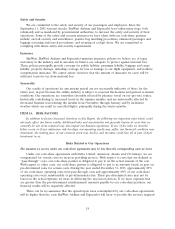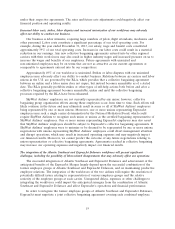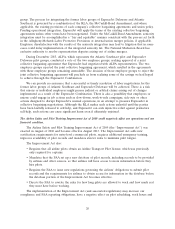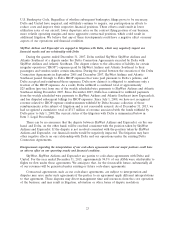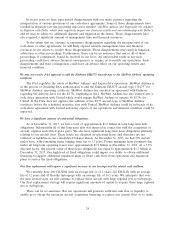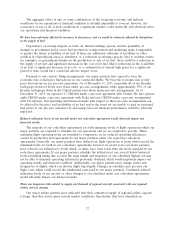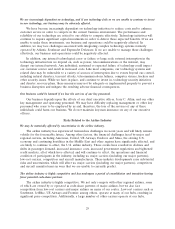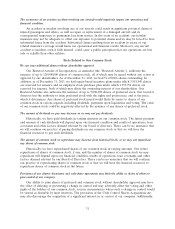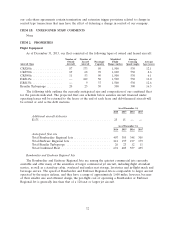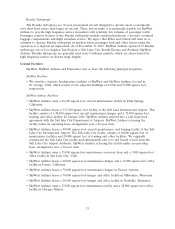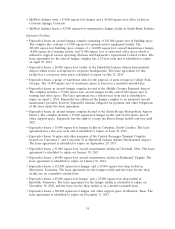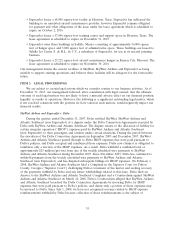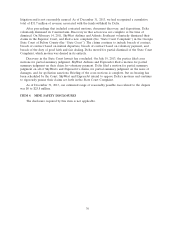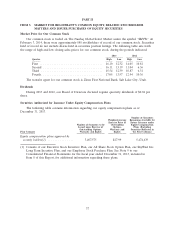SkyWest Airlines 2013 Annual Report Download - page 32
Download and view the complete annual report
Please find page 32 of the 2013 SkyWest Airlines annual report below. You can navigate through the pages in the report by either clicking on the pages listed below, or by using the keyword search tool below to find specific information within the annual report.The aggregate effect of any, or some combination, of the foregoing economic and industry
conditions on our operations or financial condition is virtually impossible to forecast; however, the
occurrence of any or all of such conditions in a significant manner could materially and adversely affect
our operations and financial condition.
We have been adversely affected by increases in fuel prices, and we would be adversely affected by disruptions
in the supply of fuel.
Dependence on foreign imports of crude oil, limited refining capacity and the possibility of
changes in government policy on jet fuel production, transportation and marketing make it impossible
to predict the future availability of jet fuel. If there are additional outbreaks of hostilities or other
conflicts in oil-producing areas or elsewhere, or a reduction in refining capacity (due to weather events,
for example), or governmental limits on the production or sale of jet fuel, there could be a reduction in
the supply of jet fuel and significant increases in the cost of jet fuel. Major reductions in the availability
of jet fuel or significant increases in its cost, or a continuation of current high prices for a significant
period of time, would have a material adverse impact on us.
Pursuant to our contract flying arrangements, our major partners have agreed to bear the
economic risk of fuel price fluctuations on our contracted flights. We bear the economic risk of fuel
price fluctuations on our pro-rate operations. As of December 31, 2013, essentially all of our Brasilia
turboprops flown for Delta were flown under pro-rate arrangements, while approximately 58% of our
Brasilia turboprops flown in the United system were flown under pro-rate arrangements. As of
December 31, 2013, we operated 17 CRJ200s under a pro-rate agreement with United. We also operate
eight CRJ200 under a pro-rate agreement with Delta and one CRJ200 under a pro-rate arrangement
with US Airways. Our operating and financial results with respect to these pro-rate arrangements can
be affected by the price and availability of jet fuel and in the event we are unable to pass on increased
fuel prices to our pro-rate customers by increasing fares our financial performance would be adversely
impacted.
Reduced utilization levels of our aircraft under our code-share agreements would adversely impact our
financial results.
The majority of our code-share agreements set forth minimum levels of flight operations which our
major partners are required to schedule for our operations and we are required to provide. These
minimum flight operating levels are intended to compensate us for reduced operating efficiencies
caused by production decreases made by our major partners under our respective code-share
agreements. Generally, our major partners have utilized our flight operations at levels which exceed the
minimum levels set forth in our code-share agreements, however, in recent years our major partners
have reduced our utilization to levels which, at times, have been lower than the levels required by our
code-share agreements. If our major partners schedule the utilization of our aircraft below historical
levels (including taking into account the stage length and frequency of our scheduled flights), we may
not be able to maintain operating efficiencies previously obtained, which would negatively impact our
operating results and financial condition. Additionally, our major partners may change routes and
frequencies of flights, which can shorten flight trip lengths. Changes in schedules may increase our
flight costs, which could exceed the reimbursed rates paid by our major partners. Continued reduced
utilization levels of our aircraft or other changes to our schedules under our code-share agreements
would adversely impact our financial results.
There are long-term risks related to supply and demand of regional aircraft associated with our regional
airline services strategy.
Our major airline partners have indicated that their committed supply of regional airline capacity
is larger than they desire given current market conditions. Specifically, they have identified an
27


